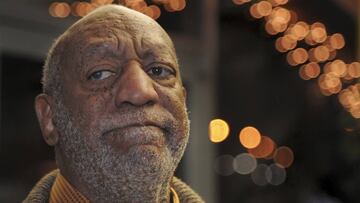Bill Cosby released by Supreme Court: how long has he been in prison and why have the charges been dropped?
The former actor and comedian's conviction has been overturned after judges ruled that testimony used in his 2018 court case was inadmissable.


On Wednesday a ruling by the Pennsylvania Supreme Court overturned the conviction of Bill Cosby, the former comedian and actor who was found guilty of sexual assault in 2018.
He had been charged in late 2015 for an encounter with basketball player Andrea Constand, who accused him of drugging and molesting her at his suburban estate.
The 83-year-old has served two years of the three- to ten-year sentence which Cosby had vowed to serve the entirety of, rather than acknowledge any remorse for the incident. CNN report that Cosby’s attorneys expect him to be released from custody later today.
"This is absolutely wild," @AriMelber says on Pennsylvania Supreme Court decision to overturn Bill Cosby's conviction. "The Court today is not saying Cosby didn't do it. The Court is saying he reached a deal never to be charged for it."https://t.co/ELYVq9HieV
— MSNBC (@MSNBC) June 30, 2021
Why was Bill Cosby’s conviction overturned?
Today’s ruling found that Cosby’s conviction for sexual assault could not remain due to an agreement the star had made with a previous prosecutor which prevented the testimony given from being used to convict him.
When Cosby was eventually charged in late 2015, District Attorney Kevin Steele used the newly-released transcript from an earlier deposition to arrest the actor just days before the 12-year statute of limitations had expired.
The Pennsylvania Supreme Court did not determine Bill Cosby’s guilt or innocence. It did, however, clearly decide that prosecutors violated Cosby’s Fifth Amendment right against self-incrimination.
— Keith Boykin (@keithboykin) June 30, 2021
https://t.co/9jhLWutpcp pic.twitter.com/1sWcRPvaSx
Today’s ruling found that the Steele’s predecessor had promised Cosby that his testimony could not be used in court when persuading him to agree to the deposition in the past. In delivering the verdict Justice David Wecht said that the previous prosecutor’s promise still stands and the testimony used in the conviction was therefore inadmissible.
Cosby’s case marked the first major conviction of the #MeToo movement
The 2018 verdict seemed at the time a watershed case in the United States as Cosby became the first celebrity to be convicted after the #MeToo movement grew to prominence. The decision to reverse the ruling may have a consequential impact on cases of this kind in the future with prosecutors potentially less inclined to use testimony in court.
It is extremely uncommon for court of appeals to overturn a jury’s verdict in the fashion. however the Supreme Court also ruled that judge had been wrong to allow additional accusers to give testimony in the Constand case.
In 2015, 35 women told us their stories about being assaulted by Bill Cosby, and the culture that wouldn’t listen https://t.co/aRuzlErpzL
— New York Magazine (@NYMag) June 30, 2021
Related stories
At Cosby’s first trial just one accuser gave evidence in court. After the jury deadlocked in that case, five more gave their testimony in the retrial, who gave recounts of encounters with Cosby in the 1980s.
CNN’s legal analyst Elie Honig explains: “Prosecutors said we want to call up to five other victims, not the ones who are charged here, but five other victims, to establish a pattern.... The judge let them do that, and now the Supreme Court has said that went too far.”